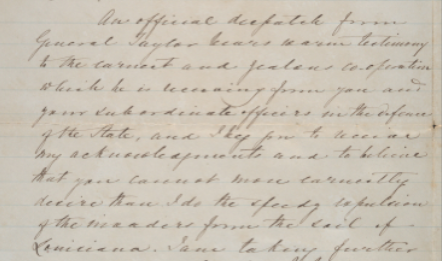| << Chapter < Page | Chapter >> Page > |
One of the Civil War-era letters is part of a correspondence between Davis and General Joseph Johnston, and the other contains a set of updates from Davis to Thomas Moore, then governor of Louisiana. Written in response to Johnston's March 3, 1862 letter, Davis's brief note addressed the general’s concerns over the inadequacy of the South’s roadways and resources for the logistics of warfare. Davis cannot offer much reassurance, and one can sense in this exchange the difficulty, if not the impossibility, of the Confederacy’s ambitions. In his letter to Moore dated September 29, 1862 , Davis is clearly trying to assuage the governor’s anxieties about the vulnerabilities of his state, in particular, to the invading Union forces. Davis writes, “An official dispatch from General Taylor bears warm testimony to the earnest and zealous co-operation which he is receiving from you and your subordinate officers in the defence of the State, and I beg your to receive my acknowledgments and to believe that you cannot more earnestly desire than I do the speedy repulsion of the invaders from the soil of Louisiana” (see Figure 2). The pressure upon Davis is palpable in this document, as he struggles to strengthen the resolve and maintain the loyalty of those under his leadership.
Letter from jefferson davis to gov. thomas o. moore, sept. 29, 1862

The final two letters, one from 1887 and the other from 1888 , were both written at Davis’s Beauvoir estate in Biloxi, Mississippi, where he spent his final years. Addressed to Dr. W. H. Sanders, the first letter is a short one simply declining an invitation due to illness. The second letter, to Martin W. Phillips, is a much longer one that finds Davis in a reflective mood. He states early in the text, “Many sad changes have occurred within that time but the saddest of all to me is the tendency in our own people to “harmonize” away the principles for which they gave property + life hoping thereby to preserve what was to them of greater value” (1). Here Davis is lamenting what many supporters of the South after the Civil War termed “The Lost Cause.” It is difficult from this brief snippet to determine if at the end of his life Davis remained invested in the specific principles for which the Confederacy fought, or if he was attached in a more romanticized fashion to the idea of the Confederacy itself. Regardless, this relatively lengthy letter (four pages) provides a fascinating peek into the private thoughts of such a major historical figure during his waning days.
These unpublished letters, accessible physically and digitally through the Americas Archive, offer exciting pedagogical opportunities for a variety of classroom settings. They would of course be valuable within any course on nineteenth-century U.S. history, or one more specifically focused on the U.S. South. Biographical approaches to Davis either individually or in concordance with other major U.S. political figures would likewise benefit from these documents. Yet another use for these letters – perhaps a less obvious one – would be in relation to the field of U.S. literary studies. The writings of other political figures, such as Thomas Jefferson and Benjamin Franklin, have found their way into the literature classroom (and, in fact, Davis authored two books during his later years, The Rise and Fall of the Confederate Government and A Short History of the Confederate States of America ). As the category of literature continues to shift to include different figure and various types of texts (letters, diaries, journals, etc.), archives become invaluable tools in providing new material to process, study, and interpret. Archives such as the Americas Archive and letters such as these by Jefferson Davis demand that we question what precisely constitutes “literature” and who exactly counts as the producers of “literature.”
Bibliography
Davis, Jefferson. The Papers of Jefferson Davis . Ed. Lynda L. Crist, James T. McIntosh, and Haskell M. Monroe. Revised edition. Baton Rouge: Louisiana State UP, 2003.
Davis, Jefferson. The Rise and Fall of the Confederate Government . New York: D. Appleton and Co., 1881.
Davis, Jefferson. A Short History of the Confederate States of America . New York: Belford Co., 1890.
Davis, William. Jefferson Davis: The Man and His Hour . Baton Rouge: Louisiana State UP, 1996.
Rable, George C. The Confederate Republic: A Revolution against Politics. Chapel Hill: U of North Carolina Press, 1994.

Notification Switch
Would you like to follow the 'Using historical documents' conversation and receive update notifications?